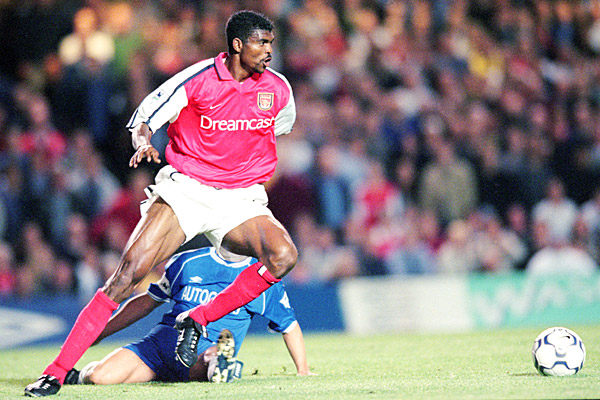The Love Affair between Nigerians and Arsenal

The love affair between Nigerians and Arsenal is an enduring one. Other English teams are also popular in the country, but the attachment many Nigerian football fans formed with the club during Nwankwo Kanu’s five year spell at Arsenal has withstood the frustrations of following the Gunners in the past few years.
Following Arsenal’s impressive win over their high-spending local rivals, Tottenham Hotspur, Nigeria’s former vice-president Atiku Abubakar tweeted the following:
This was just what I needed: An @Arsenal win to lift me up at a moment like this
Context: Abubakar is a leading figure in Nigeria’s ruling PDP party (neoliberal, right-wing), which has been tearing itself apart at its convention in the past 48 hours and split just a few hours ahead of kick-off at the Emirates Stadium.
Abubakar is by no means Arsenal’s only powerful supporter in Nigeria. The cement tycoon Aliko Dangote, thought to be worth $20 billion, is also a Gunner. And just yesterday Naija Twitter King Tolu Ogunlesi “signed” for Arsenal, outing himself officially as a Gooner (prompting historian Max Siollun to ask why Nigerians had never felt the same affection for Bolton Wanderers on the basis of Jay-Jay Okocha’s exploits at the Reebok Stadium — answers on a postcard, please).
Kanu was a dream of a player, a two-time African footballer of the year. He won an Olympic Gold medal with Nigeria in 1996 and two English league titles with Arsenal.
Last year I compiled a list of the greatest goals scored by African players in the English Premier League since its inception in the early 90s. Kanu came in at number two, behind only Tony Yeboah. Here’s what I wrote about him:
Two nil down at Stamford Bridge, with 15 minutes left, Kanu came up with an incredible match-winning hat-trick. Great goals can be judged in lots of ways. One is their level of difficulty, and what Kanu did against Chelsea in the dying minutes of that match was something just extraordinarily difficult. Chasing an overhit Davor Suker pass, Kanu somehow kept the ball in play as he blocked Albert Ferrer’s blasted clearance at point blank range with a stretch of his long left leg. Chelsea keeper Ed De Goey charged out and cornered him on the by-line, and it seemed Kanu’s only option was to try to cut the ball back for Overmars and Suker waiting in the middle. Perhaps that’s what De Goey thought too, because Kanu sold the Dutchman the most languid, the most delicious of dumbies. As De Goey slid for the ball, the Nigerian danced inside him, trod in a large puddle that gave up a visible splash, and from the narrowest of angles sent the ball skimming just over the heads of Marcel Desailly and Frank Lebouef and into the top corner of the far post.
It was the best goal the great man would score for Arsenal, though this defence shredding burst of skill against Spurs and this exquisite back-heel-on-the-run against Middlesborough were also pretty special.
*Originally published on our new Football is a Country Tumblr. Our Football Department will be tweeting from FutbolsaCountry from now on.



















